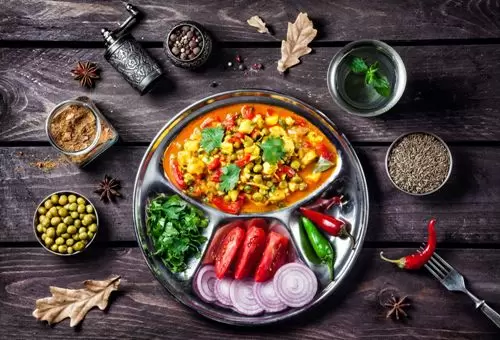Regaining the lost wisdom from previous generation in terms of health care and well being
25-April-2016
Vol 7 | Issue 17
Ayurvedic expert Reenita Malhotra Hora, in the latest book, The Ayurvedic Diet, published by Harper Collins presents a jargon-free nutritional wellness guide for that seemingly elusive healthy lifestyle. In this excerpt, read about “some key facts about the Ayurvedic diet that are fairly elementary, but many people aren’t aware of because they somehow got lost along the way”.
 |
|
Ayurveda insists upon fresh foods and condiments that can
rev up the digestion process (Photo: WFS) |
Most people think of Ayurveda as some fuddy-duddy, hard-to-follow, ancient dietary regimen preached by your grandmother. And while it’s true that she probably did preach it, the system is far from what you may think.
In fact, it makes perfect sense. Wisdom from previous generations is probably our greatest legacy and unfortunately, as we have so-called ‘evolved’, over the years we’ve lost way too much of that basic wisdom that was historically passed down from generation to generation.
To put this in context, here are some key facts about the Ayurvedic diet that are fairly elementary, but many people aren’t aware of because they somehow got lost along the way:
1. Fresh foods is what it’s all about
Consider this – if you eat an apple at peak freshness, it tastes good and chances are that it’ll make you feel great too. But are you going to eat an apple that’s soft and wilted? First off, it’ll taste bad and second, it’s not going to do anything great for your health, is it? I can’t stress enough how much Ayurveda insists upon fresh food. Food that is stale starts going bad not just outside its packaging, but also inside your body, releasing toxins into the digestive system which are then absorbed by your other bodily systems too.
Were you aware of this already? Then why is it that I am ready to bet that you resort to ready, prepared meals or preservative loaded packaged foods at least a few, if not several, times a week?
Low quality foods such as canned, processed, spoilt, refrigerated and genetically engineered foods, alcohol, tobacco and narcotics are known as tamasic foods or those that create resistance to the mind-body’s normal course of action. These foods should be completely eschewed at some stage of life as they cause physical and mental dysfunction over short and long terms. Frozen or refrigerated meals, and food prepared with preservatives and chemicals are a recent Western import that strays far from Ayurvedic nutritional health philosophies. How many times have you seen or heard your grandmother prepare fresh breakfast, lunch or dinner? That’s because in Ayurveda, we don’t have any concept of left overs – stale food is tamasic. It starts rotting barely a few hours after it has been prepared and no amount of refrigeration is going to change that. So why would you keep rotting food in the fridge, much less lace your insides with it days later? …
2. Ayurveda is not a vegetarian philosophy
Contrary to popular belief, Ayurveda is not a vegetarian philosophy. In fact, its ancient texts provide detailed ways and means of preparing meats. Most Ayurvedic doctors and clinicians however, tend to adopt a largely vegetarian take on Ayurvedic cuisine as it is considered to be ‘karmically inappropriate’ to kill animals. From a general health point of view, animal foods are becoming increasingly toxic as we continue to industrialize food production. Gone are the days of hunting and wild farming, so you have to be really careful about where and how you buy your meats. Also, vegetarian foods detoxify and purify the mind-body as much as they build it. …
3. Eating Ayurvedically doesn’t mean eating desi food only
Despite the general consensus, Ayurvedic cooking does not have to exclusively yield ‘Indian food’. As long as it is prepared as per Ayurvedic principles, it can fit into just about any cuisine. Traditionally, Ayurvedic doctors and health centres have served dal, chawal and khichadi primarily because that is the staple of Indian cuisine. Ayurvedic specialists, if not doctors, are growing in numbers throughout the world and as individuals continue to explore different cuisines and cultural food preparations, the principles of Ayurveda have gone well beyond Indian borders. …
4. Ghee aids weight loss and lowers cholesterol
Common thinking tells us that ghee leads to weight-gain and builds cholesterol in your arteries. Not true and quite the opposite in fact! Ayurveda has been using ghee for thousands of years to do quite the opposite – to rid the body of toxins which clog up the channels and create problems for the heart and most other organ systems. The oily or unctuous nature of ghee has a similar characteristic to that of a toxin which is why it is one of the greatest solvents that will, like Pac-Man, attack fatty toxins lodged in your tissues to loosen, liquefy and extract them through the regular digestive process.
Not only that – ghee is vital to feed and build the dhaatus and pacify the vata and pitt a doshas. Did you know that a hundred-year-old ghee was known to be an instant cure for nervous-system disorders? Back in the days of yore, Indian households would store ghee in large vats and pass it down from generation to generation. Today it is hard enough to persuade a family member to make the ghee at home, let alone store it. ...
5. Eating ginger before your meal powers up digestion, enabling you to keep your weight in check
Eating Ayurvedically is all about improving the efficiency of your digestive system. Perfect digestion is the core of perfect health, and imperfect digestion leads to things like weight gain, toxic overload and illness. Therefore, the principles of Ayurvedic ‘ahar’, or food as medicine, among other things include pre- and post-digestive tips like eating ginger before a meal to stimulate your ‘agni’ or digestive fire. It’s akin to powering up an engine to make it function better. If the engine is powered up then naturally it’s functioning, i.e., the digestion will also be better. The Japanese who are pros with this concept have actually cultivated the habit from Ayurveda. We in India on the other hand have conveniently forgotten these things.
(Excerpts from The Ayurvedic Diet by Reenita Malhotra Hora; Published by Harper Collins; Pp: 195; Price: Rs 299.) - Women's Feature Service














